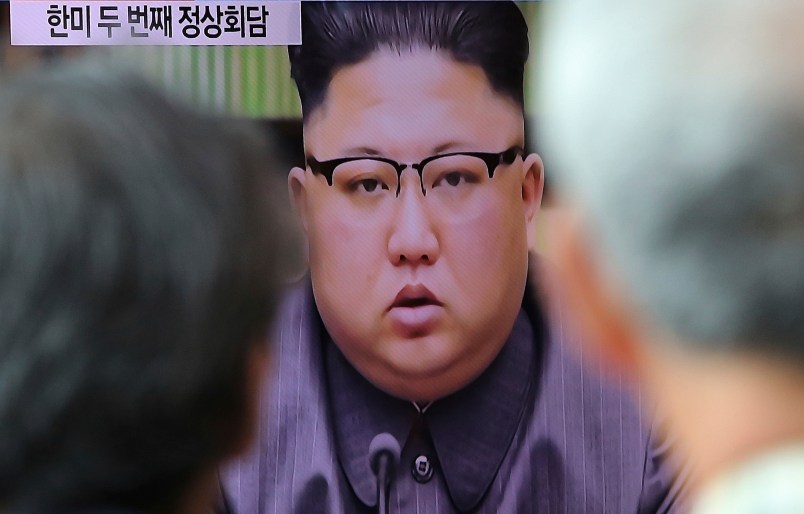SEOUL, South Korea (AP) — Famous for using bombastic, derogatory and often-awkward English slams against enemies, North Korean state media sent people scrambling for dictionaries Friday with a dispatch that quotes leader Kim Jong Un calling President Donald Trump “the mentally deranged U.S. dotard.”
The what?
Dotard means a person in a feeble or childish state due to old age. It’s a translation of a Korean word, “neukdari,” which is a derogatory reference to an old person.
It was used in an unusual direct statement from Kim that the Korean Central News Agency transmitted verbatim in response to Trump’s speech at the U.N. this week, in which he mocked Kim as a “Rocket Man” on a “suicide mission,” and said that if the U.S. is “forced to defend itself or its allies, we will have no choice but to totally destroy North Korea.”
Past KCNA reports have used the Korean word against South Korean conservatives, but they rarely translate it as dotard.
Sometimes, it is translated into the neutral “old people” or omitted, depending on the context or the importance of the statement. KCNA last used the word in February to describe supporters of ousted South Korean President Park Geun-hye, whom it also called “neukdari” and a “prostitute.” Before that, KCNA called Park’s conservative predecessor, Lee Myung-bak, “the traitor like a dotard.”
So why did KCNA use the word again?
It may have simply resorted to a Korean-English dictionary. Putting “neukdari” into a popular online Korean-English dictionary in South Korea returns two English equivalents: an “aged (old) person” and a “dotard.”
There has been a widening linguistic divide between the rival Koreas, but “neukdari” has the same meaning in North Korea as in the South, according to a South Korean organization involved in a now-stalled project to produce a joint dictionary.
The Korean version of Friday’s dispatch places “michigwangi,” which means a mad or crazy person, before “neukdari,” so a more accurate translation might have been a “crazy old man” or an “old lunatic.”
In the past, KCNA has occasionally not published English versions of crude insults directed at U.S. leaders or officials in an apparent effort to differentiate its statements for domestic audiences and outsiders.
KCNA called President Barack Obama a “monkey” in 2014, but attributed the remarks to a factory worker and did not issue an English version. Later the same year, an unidentified North Korean defense commission spokesman called U.S. Secretary of State John Kerry a wolf with a “hideous lantern jaw,” but again only in Korean.
After Trump threatened North Korea with “fire and fury” in August, Gen. Kim Rak Gyom, commander of the North’s strategic rocket forces, was quoted in a KCNA Korean dispatch as saying Trump showed his “senility” again. But the KCNA English dispatch omitted that word.







Many are “baffled”? I’m not sure why. The North Koreans seem to have a reasonably accurate understanding of the situation in the U.S. White House. Although, their suggestion that they can “tame” him seems like a bit of hyperbole… I mean, if that part were easy, we’d have done it, ourselves; it’s not like John Kelly lacks motivation.
Well, I think dotard is the nearly perfect word to describe Trump. I am impressed with the translator’s skills.
I don’t like what is transpiring between NK and us, but I suspect Kim Jong Un is achieving his goal of demonstrating in full public view what many foreign leaders have already grasped, and that is, Trump is confused about most things, and his practice of bellowing and threatening is mostly bluster without the bravado required to follow through. That is, in the moment venting that doesn’t lead to much.
Actually it’s an inadvertent two-fer, because Trump’s just in it for the “dough”.
There’s nothing baffling about it. It’s brilliant.
Dotard Trump = Donald Trump
This is way above the usual level of translation, it’s an instant meme.